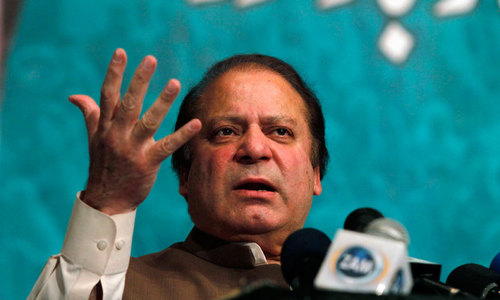Only hours after his appearance before an accountability court, Nawaz Sharif held a press conference and read out the statement that he gave in the Avenfield reference earlier in the day.
The ousted premier on Wednesday, at the court and the press conference, claimed that charges were framed against him as a punishment for his unwavering stance on civil supremacy — and particularly for filing a high treason case against Pervez Musharraf.
"It is not easy to bring a former military dictator to court," he said while referring to the initiation of a treason case against the former president.
The ousted premier also criticised his political opponents, including PPP's Asif Ali Zardari, Pakistan Tehreek-i-Insaf head Imran Khan and Tahirul Qadri of Pakistan Awami Tehreek for taking sides with former dictator Pervez Musharraf.
"On October 12, 1999, a general named Pervez Musharraf captured power by betraying the Constitution. The judges who welcome dictators in every era came forward to welcome him. Eight years later, on Nov 3, 2007, he [Musharraf] broke the Constitution again in the name of emergency, he put a martial law, holding 60 judges including the then chief justice captive in their homes," he maintained.
"As a democratic party, the PML-N took a clear stance against Musharraf's acts. Keeping this stance, we clearly stated during the election campaign for the 2013 elections that Musharraf will be tried for high treason, under Article 6 of the Constitution, if the PML-N formed a government."
He continued that after the PML-N formed its government in 2013, it initiated making contacts with legal experts on the case.
"I was advised to let go of this decision. Messages were delivered that nothing would happen to him [Musharraf] because of the cases but a lot of difficulties would be created for me. Ignoring these suggestion-like-threats, I remained steadfast in my aims," he added.
"Even before this, during the PPP's tenure, Asif Ali Zardari came to me with a mainstream political leader and said that we should validate Musharraf's second martial law. Zardari tried to explain to me that this was expedient. I said that for the past 65 years, we have been using such expediency which has weakened the democracy. Now the time has arrived that the dictators who broke the Constitution should not be given indemnity and instead be brought to the court. He [Musharraf] should be asked why he broke his oath and used the power of the armed forces for his personal aims," he recalled.
Nawaz claimed that it was no longer a secret how the plan for the 2014 Islamabad sit-in was made, who supported the protesters for four months, and who made them call for his resignation as prime minister over alleged rigging in the 2013 election.
PTI Chairman Imran Khan "himself spoke of the umpire's finger being raised", Nawaz said. "Who was the umpire?" he asked.
The PML-N supreme leader alleged that the purpose of the 2014 sit-in was to remove him from power so that a treason case against Musharraf could be dropped.
"During those days, an intelligence chief had sent a message to me that I should resign or go on a long leave," he said, adding that it was very saddening.
"The purpose behind my attempted ouster was that it would not be difficult to wrap up the case against Musharraf if I had been removed," he alleged.
"By 2013 when the process of a treason case begun against Musharraf, I realised that bringing a dictator to a court is not an easy job, despite the position of the Constitution, democracy, and the concepts of the supremacy of the parliament, rule of law and the mandate of the people of Pakistan in state affairs," he continued.
"Perhaps all weapons of law and justice have been made for politicians. When faced with the tyrant, they become blunt and even steel becomes wax," said Nawaz.
He said when he did not bow down and decided to pursue the case against Musharraf, the sit-ins began. The reason behind the sit-ins was also to bring him under pressure in the Musharraf case.
Nawaz alleged that the sit-ins surfaced after a meeting between Khan and Tahirul Qadri in London. The sit-ins participants had the complete support of whoever the umpire was.
He said that the main purpose of the sit-ins was his removal so that the treason case against Musharaf could not go ahead.
"I want to say that the reason for my removal and the unfounded, malicious allegations against me is that I had refused to obey the orders," he said, adding that he, being in power, had been considered a barrier to the achievement of certain goals so he was removed from the party's chairmanship.
"The power comes in the hands of a few [military officers] but its cost is paid by the entire army," he said.
The ouster premier rejected the impression that he was against the army. "I know that the army's weakness is the weakness of our defences. I recognise the services of the soldiers who lay their lives," he said.
He added that he had rejected an offer of $5 billion and instead opted to conduct nuclear tests in order to cement the country's defences in the 90s.
"Was there a Panama at that time? The answer is simply no. At that time, too, I was demanding civil supremacy. I wanted foreign and domestic policies to be in the hand of the elected representative."













































